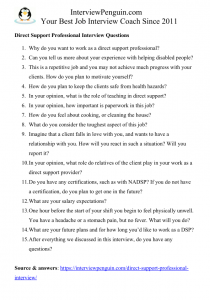Physical and intellectual disabilities are ever more prevalent in the Western world. With our horrible lifestyle and unhealthy diet, the trend will continue. More and more people will be dependent on someone else’s help. It makes no sense to hide from the reality.
But you can make the picture at least a bit brighter. Maybe not for the entire world, but for one individual, or a group of people with disabilities, you can. DSP is more than a job. It is a mission to help disabled individuals integrate into society and live a decent life.
Hats down that you decided for this profession! All I can do for you is help you prepare for the interviews. Let’s have a look at some questions you may face.
Table of Contents
Why do you want to work as a direct support professional?
This is a difficult job, and you won’t earn more than a janitor or a waiter in a small cafeteria. If you are in for money, you won’t stay long… What’s more, this job does not really offer any career growth options. Direct support is what it is, and you cannot hope for a promotion in one year time.
For all these reasons, you should refer to the meaningful purpose of the job. Say them that you feel for the disabled, and with your job choice you try to give some meaning to your everyday life, while helping someone else find their meaning and place in the society.
Another option is narrating a story. Maybe you had your own period of disability in life (for example after an accident or a difficult surgery), and during this period you understood how much certain people depends on someone else’s help–because for a short time you also depended on someone to help you, even with the very basic routines–eating, personal hygiene, going to toile, navigating a staircase…
After this experience your perspective has changed, and you decided to work in DSP. Everyone love to hear good-feel stories, and interviewers are no exception.
Can you tell us more about your experience with helping disabled people?
They do not ask about your professional experience. You may talk about anything–volunteering in a hospital, helping your granny who suffers from dementia, or even about your own temporary disability you had to cope with.
Interviewers observe a lot when you talk about working with people with disabilities. Do you see the job realistically? Is there some compassion, and perhaps even some enthusiasm in your voice? Do you talk also about “unpleasant” duties, such as cleaning the bed from feces, changing diapers, helping with bathing, etc?
If you demonstrate realistic expectations, understanding for the disabled, and willingness to take care of everything that belongs to this job, they will be satisfied with your answer.
This is a repetitive job and you may not achieve much progress with your clients. How do you plan to motivate yourself?
I suggest you to say that you do not aim for achieving any groundbreaking milestones with your patients. You know how it works with disabilities–they allow for minor progress only, step by step, and you will always reach a limit. A wheelchair bound client can learn to do a lot of things with their hands, but they will never run down the stairs (this is just an example of course).
You can say that you do not mind repetition, and rather than for progress you aim for being a positive influence in the daily life of clients–someone they can rely on, someone they look forward to meeting each day, and so on. You may achieve decent progress with some and no progress with others, but in any case, you will be there for them, making their daily life easier, helping them to find some meaning in life. And that’s certainly motivating enough.
How do you plan to keep the clients safe from health hazards?
Logically this depends on your place of work (group home, assisted-living facility, or directly in the household) and client’s disability. You can start your answer emphasizing individual approach to each client, especially if you do not know the person/people you will support. If you know the target group, you can be more precise in your answer.
For example, if you work with people with mental disabilities, you should certainly keep all sharp objects (knives, razors, etc) out of their reach, perhaps stored in locked drawers. Prepare their dosage of medication each morning and evening is also important in order to prevent overdose.
Another thing altogether is referring to their social interactions. People with disabilities are more prone to abuse or exploitation. Working as a direct support provider you should keep an eye on everyone who’s in regular contact with your clients, and report any suspected abuse or neglect to appropriate authorities.
Special Tip: Download all questions in a one page long PDF, and practice your interview answers anytime later:
In your opinion, what is the role of teaching in direct support?
You should give it an utmost importance. As a famous saying goes: Give a man a fish and you feed him for a day; teach a man to fish and you feed him for a lifetime.
Say the interviewers that you will try to teach your clients to handle some duties independently, of course within the medical limits of their disability (not the self-imposed limitations they may have).
You understand the difference learning a new skill, or doing something without help of another person, can make in their life. Not only in terms of making their daily routines easier, but also in their mental well-being. They will gain new confidence, they will feel better about themselves, and perhaps learning one skill will allow them to learn other skills down the road.
At the end of your answer you can emphasize patience. It can take months until a disabled person learns a new skill. A good direct support provider won’t rush things. They will patiently guide the client on their way, step by step, even if it takes months to achieve any minor improvement.
In your opinion, how important is paperwork in this job?
With most direct support providers you’ll be responsible for reporting on behavior, problems, and progress of your patients. And while such paperwork certainly isn’t the core of this job, you should still give it high importance.
Because there may come a day when you leave the job, or at least change your place of work. Without proper documentation, it would be hard for your successor to continue working with the client and to benefit from all the things you achieved with them and learned during your work.
Ensure the interviewers that you will take care of all paperwork required by their institution, following their rules and regulations. You will happily do so, because you understand the importance of monitoring and reporting on client’s well-being, progress, and problems.
How do you feel about cooking, or cleaning the house?
Direct support provider is neither a cook nor a maid. Still, different clients require help with different tasks, and you should show some flexibility in your job interview.
Interviewers may ask about a variety of things–showering the client, cleaning the toilets, changing bad sheets, cooking meals. Helping with personal hygiene and toilet is definitely on the list of your duties, while cooking or sweeping the floor is sort of a grey zone in this profession. Therefor I suggest you to say the following:
While cooking or cleaning the house is not your main duty, you will do all you can to help your client with their daily routines, and to live in a clean house and have a good and balanced diet, suitable for their diagnosis and needs. If there is time to cook or clean a house, and you will not neglect your main duties while doing so, you will happily take care of these duties.
Other questions you may face in your direct support job interview
- What do you consider the toughest aspect of this job?
- Imagine that a client falls in love with you, and wants to have a relationship with you. How will you react in such a situation? Will you report it?
- In your opinion, what role do relatives of the client play in your work as a direct support provider?
- Do you have any certifications, such as with NADSP? If you do not have a certification, do you plan to get one in the future?
- What are your salary expectations?
- One hour before the start of your shift you begin to feel physically unwell. You have a headache or a stomach pain, but no fever. What will you do?
- What are your future plans and for how long you’d like to work as a DSP?
- After everything we discussed in this interview, do you have any questions?
Conclusion, next steps
Interview for a job of a Direct Support Professional belongs to easy job interviews. In almost each country of the world there is a lack of direct support workers, and providers are eager to give a chance to anyone who demonstrates right attitude to work and people, and realistic expectations. Higher education, previous experience, or certification aren’t required.
If you prepare for the questions from this article, show the right attitude, and do at least some research about your prospective employer, you should make it and get the job. I wish you good luck!
May also interest you:
- CPS interview questions.
- Case Manager interview questions.
- Special Education Teacher interview questions.



